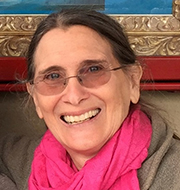I am keeping in mind exhortations for peace, especially Dr. Martin Luther King Jr’s words, “Peace is not merely a distant goal that we seek, but a means by which we arrive at that goal.” As we commemorate the 37th anniversary of Salt II, Iran plans to build ten new uranium enrichment plants. Many Americans have just celebrated Thanksgiving and Muslims from around the world have just made their Hajj to Mecca for Eid al-Adha. So, this news has particular dissonance during the season of hope we’re entering that culminates with different faith-based traditions celebrating in their own way light at the darkest time of the year. With other nations also pursuing similar ambitions, we are moving away from nuclear disarmament. ... more
Inter-connectedness
Graham Bowley’s pieces in The New York Times “Bailout Helps Fuel New Era Wall Street Wealth” and “Bonuses Put Goldman in Public Relations Bind” and The Financial Times editorial “Public Needs More Bang for Its Buck” are among a rash of recent articles describing a disparity that virtually everyone is experiencing. I find great cause for concern about the trend these pieces expose, as history shows that depriving many people of even the fundamental basics while a select few benefit astronomically never is sustainable. Frank Rich’s earlier op-ed “The Rabbit Ragu Democrats” highlights how the main relationships businesses currently cultivate are with lobbyists who can press their pet concerns with government officials. His is a cautionary tale of the adverse affects... more
At 4:58am Archbishop Desmond Tutu sent me an email about President Barack Obama being the recipient of the Nobel Peace Prize. Tutu used the affectionate terms by which I call him and his wife Leah and the one we use for fellow Nobel Peace Laureate President Nelson Mandela in writing, “Leah was crying with joy and disbelief as we watched an epoch-making event unfolding before our eyes. What a fantastic result, what a fantastic human being, what fantastic people, what a fantastic country. What hope you all have aroused in the rest of the world. Thank you God, thank you friends, thank you for filling us all with hope that change is possible. Yippee…it is so like when Madiba became... more
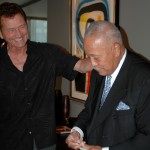
I’ve been reflecting on how my international work and relationships with people globally mirrors what I have made my “extended family”. Immaculée Ilibagiza, who survived the Rwandan genocide in a three- by four-foot hidden room with seven other women for 91 days, and Helen Silberberg (1927-2207), my cousin’s mother-in-law who survived the Holocaust in a Nazi Concentration camp when she was a teenager, gave meaning to each other and all those who were at one of my family gatherings. The four living generations of my “actual” family (as typically defined in our culture) have roots from many nations, cultures and religions. My husband just went from Belfast to Monegal to Ballyferriter reconnecting with his own and President Barack Obama’s Irish... more
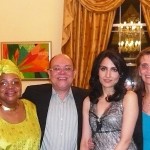
I looked around the table at the dinner Ambassador Lindiwe Mabuza, South Africa’s High Commissioner to the UK, had hosted in honor of my husband and me on Mandela’s birthday in tribute to our long history of support for South Africa’s freedom. While I simply had invited friends who I knew in London, I saw that among the 11 present we hailed from India, Mexico, Nicaragua, Ghana, the UK, South Africa and the US; had family roots in Ireland, Germany, Russia and Poland; had done work in the Philippines, Uganda, Colombia, Cambodia, DRC and other places throughout the world where people had experienced profound trauma. Then the one guest Lindiwe had invited who I’d never met before, Tessa Uys, one of... more
My husband Jerry Dunfey and I are going to 10 Downing Street tonight for an event Sarah Brown is hosting for the Donald Woods Foundation, a philanthropic development organization. Woods was a very close friend of ours and had to escape from apartheid South Africa after he broke the story of Steve Biko’s murder. Jerry is a Founding Patron of the foundation with Wendy Woods and Ntsiki Biko, respectively the widows of Donald Woods and Steve Biko. Desmond Tutu, who married us, will be the other special guest at 10 Downing St. To get into the spirit of the connections between the British anti-apartheid movement and the struggle within South Africa, we stopped at the statue of Nelson Mandela that was... more
I am not surprised by today’s story in The New York Times about Russians not clamoring to see President Obama as people have in other countries. While even the U.S. still has to grapple with zenophobia, closed nations with state-controlled media are even more distrustful of “the other.” My Bubby and Zayde (grandmother and grandfather in Yiddish) escaped the Tsarist pogroms with my then-young uncle Mersh. More recently, we’ve seen how Chenchens, and Ossetians and Abkhazians have been treated by Russia. We have a long way to go in our own country, but at least we have the advantages of an open society where we freely can voice dissent. But I believe whether here or in other nations, ethnic violence is based... more
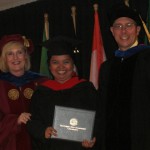
I gave the Graduation Commencement Speaker at Southern New Hampshire University’s International Program of their Graduate School of Community Economic Development today. The students are practitioners from around the world who already have made significant contributions to development efforts in many nations. With the Masters of Science in International Community Economic Development they received at this degree ceremony, they will leverage their ability to achieve even greater accomplishments. After an excerpt of my remarks, also watch video clips of graduate speeches. Also post your comments about successful economic development efforts, whether by corporations, governments or NGOs. Keeping with the spirit of international cooperation fostered in this graduate program, rather than choosing a single student to make commencement remarks, a group did a... more
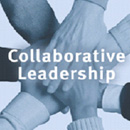
Development does not take place in a vacuum; it is intertwined inextricably with every aspect of the comprehensive institutional integrity. The whole always is greater than the sum of the parts: leveraged synergy advances specific sub-objectives. We will explore how to create and sustain horizontal and vertical collaboration for integrated organizational leadership. With guest panelists Kofi Boateng, COO of Africa America Institute, Bill Bohnett, Board member of Synergos Institute and Kona Goulet, Devlopment Director of EnlightenNext we explore this topic in the NYU graduate course I created and teach annually. Watch two- to three-minute video clips of each and if you have interest in seeing more of the discussion contact us.
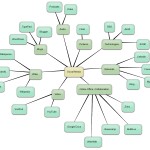
We explore how, regardless of your organization’s size, length of time in existence or level of expertise, you can begin to utilize or expand upon your current use of the myriad web-based options that can increase the effectiveness of your organizational initiatives and help you sustain them. Guest panelists Danny Moldovan, Change.org; Sarah Durham, Big Duck ; and Frankie Cheung, DonorsChoose.org describe various strategies and tools for different needs, depending upon capacity. Watch two- to three-minute video clips of each and if you have interest in seeing more of the discussion contact us. Also post your comments on how you use the internet to advance your cause-related strategies and initiatives, whether you are with a corporation, a foundation, a government or any other public or private... more


